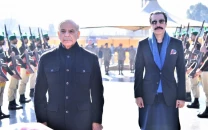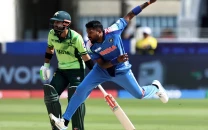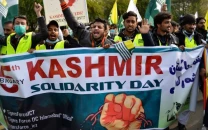Sanaullah Khan: From artist to activist
Septuagenarian musician recalls TV debut and ouster from PTV years later

Image courtesy: Batool Nasir/Design by Essa Malik/Express
In the winter of 1963, a Peshawar-bound train from Karachi started pioneering a new sort of entertainment: television - a medium alien in Pakistan at the time. The train had a special compartment where a CCTV camera was installed by a foreign company. New, emerging talent was given a chance to perform in front of the camera while the performance was televised on a screen on the platform outside. The train stopped at every prominent station, railway junction and district headquarters, with entertainers inside the train putting up a show for those gathered outside.
When 19-year-old Sanaullah Khan heard about the project, he rushed to the train station at Gujranwala and waited eagerly for the locomotive’s arrival along with hundreds of others. The train remained stationed for three hours before a foreigner managing the project finally invited Khan to perform. And thus, Sanaullah sang a melodious song, making his debut on a TV screen even before the launch of Pakistan Television (PTV), which was founded on November 26, 1964. “As a TV artist, I’m a year senior to PTV itself,” he proudly explains.
Seated on an old bed in a small room with worn out walls, he narrates how a young man, born in Jhelum in 1944, was given a chance to work for Pakistan’s first radio transmission. “In 1965, I auditioned for Radio Pakistan Rawalpindi and got selected as a flutist and drama artist,” recalls Khan, who picked up the flute at the age of six.
Two years later, PTV was launched in Rawalpindi on Staff Road Chaklala and Khan was selected for their segment, Rawal Orchestra. This marked the beginning of an illustrious career at PTV, where he appeared as a narrator, actor and flutist.
Khan performed in various programmes including the famous Bengali musical show, Nazrul Geeti, which was produced by director Muslihuddin and his wife, prominent playback singer Naheed Niazi. He also wrote a few scripts in Urdu in connection to the national integration of East and West Pakistan. Yet, something was burning inside the young and energetic Khan.
In 1968, the fraternity of artists initiated a campaign for their protection as well as the promotion of art. As a young artist, Sanaullah too became a part of this campaign headed by revolutionary intellectual and poet, Faiz Ahmad Faiz. Dr Anwar Sajjad, singer Shaukat Ali, actors Sikandar Shaheen and Mahmood Ali were also among those who joined the movement.
At the age of 27, he played an important role in the formation of the Pakistani Artists Equity that united artists, actors, writers and musicians under one banner. Khan eventually earned a reputation for having controversial opinions and speaking out against red tape in the radio and TV industry.
“Aslam Azhar, who was the controller at PTV, was promoted overnight to managing director when a politician took over as the chief martial law administrator,” he says in a veiled dig at Zulfikar Ali Bhutto. “Azhar had a ferocious attitude towards helpless artists. And I was battling against the cancer of corruption and nepotism at PTV, because of which I was banned from entering the station,” shares Khan, bitter at the treatment meted out to him by Azhar, the man known as the ‘Father of PTV’, who died in December last year.
His struggle, however, was not in vain. “After this episode, no artist or writer was ever banned from the state-run TV channel,” he claims, saying others benefitted from his fight against favouritism. Radio Pakistan, on the other hand, was kinder to Sanaullah. “I was given a five-year contract during the late 70s and early 80s to write and broadcast social reformatory features and dramas on a weekly basis.”

Today, even at the age of 72, he refuses to call it a day. He works with educational and social welfare organisations on musical programmes and dramas, in addition to performing at embassies of different countries. “If financial success is the only criterion to define artistic success then yes, no doubt, I am a loser. But I have lived my life on my own terms and have never compromised on my principles, so artistic acclaim does not matter to me at this point.”
Published in The Express Tribune, February 15th, 2016.



















COMMENTS
Comments are moderated and generally will be posted if they are on-topic and not abusive.
For more information, please see our Comments FAQ